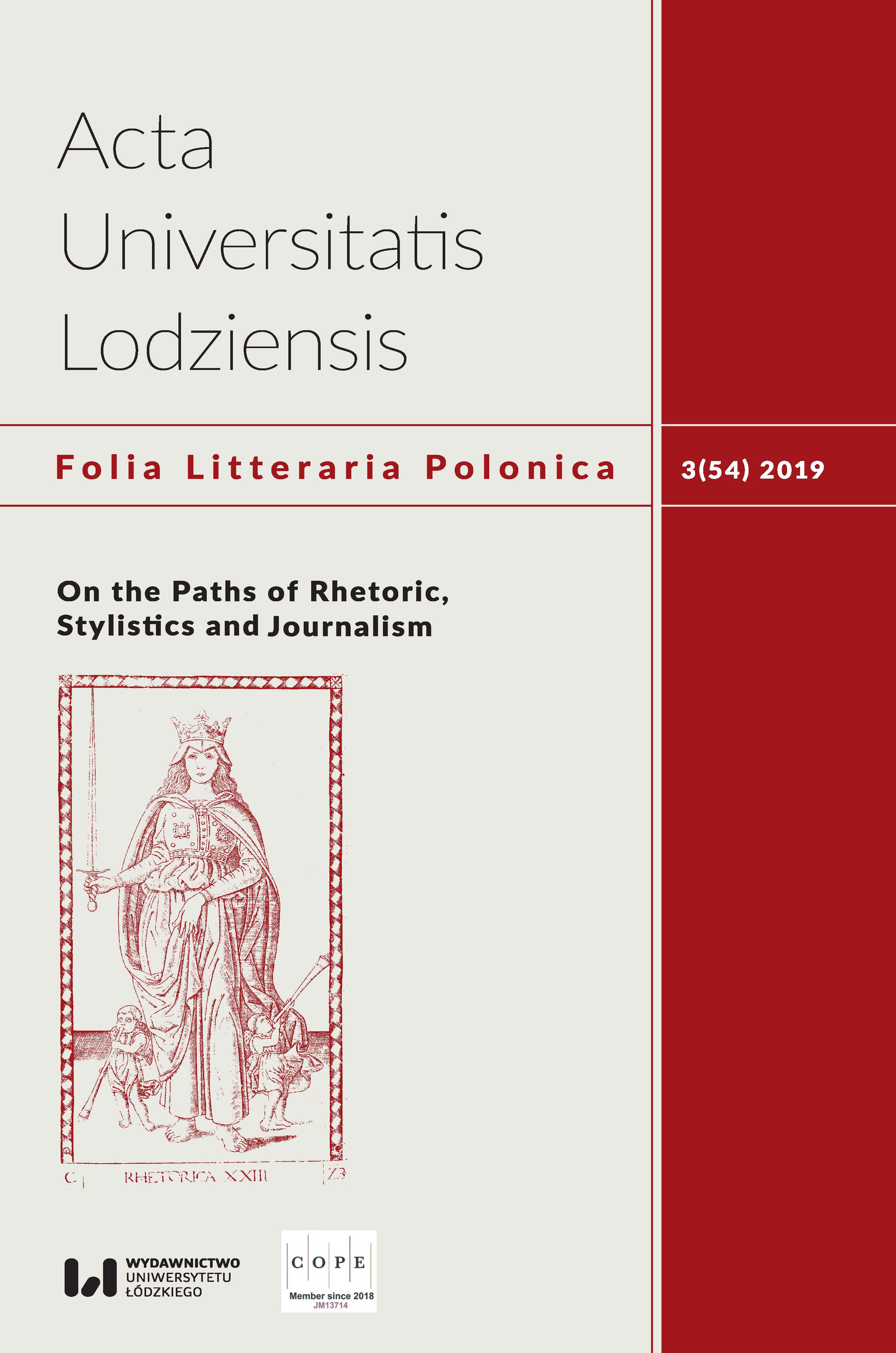Rhetorical Styles in Knowledge Communication
DOI:
https://doi.org/10.18778/1505-9057.54.04Keywords:
style, rhetoric, metalanguage, academic discourse, scientific popularizationAbstract
The author of the article applied the rhetorical framework of three styles (genera dicendi) to highlight some of the communicative practices employed in academic discourse. By utilising the persuasive resources of the plain style, authors focus on the rhetorical purpose of docere/probare, i.e. to teach/to prove. The sober matter-of-factness of the plain style suggests to readers that there is no style at all, convincing them that the content reflects reality without any rhetorical mediation. In choosing the persuasive means of the middle style, researchers combine epistemic and aesthetic goals, trying to reach the rhetoric purpose of delectare, i.e. to delight. An engaging style helps them draw readers into intellectually complex issues. The grand style facilitates the reaching of the rhetorical purpose of movere, i.e. to move or induce action. It serves to present science as a helpful resource for readers to make decisions in their lives, hence it is likely to be used by engaged scholars and public intellectuals.
Downloads
References
Ad C. Herennium: de ratione dicendi (Rhetorica ad Herennium) [Cicero], trans. into English by H. Caplan, Harvard University Press, Cambridge MA / William Heinemann, London 1989.
Google Scholar
Altieri Biagi, Fra lingua scientifica e lingua letteraria, Istituti Editoriali e Poligrafici Internazionali, Pisa–Roma–Venezia–Vienna 1998.
Google Scholar
Aristotle, Retoryka. Retoryka dla Aleksandra. Poetyka, trans. H. Podbielski, Wydawnictwo Naukowe PWN, Warszawa 2004.
Google Scholar
Berardinelli A., La forma del saggio. Definizione e attualità di un genere letterario, Marsilio, Venice 2002.
Google Scholar
Bogołębska B., “Proces wyodrębniania się teorii stylu na przełomie wieku XIX na XX”, Stylistyka 1993, issue 2, pp. 163–171.
Google Scholar
Bogołębska B., “Romantyczny model retoryki i nauki o stylu. Przegląd problematyki”, Acta Universitatis Lodziensis. Folia Litteraria Polonica 1998, issue 1, pp. 139–152.
Google Scholar
Bogołębska B., Studia o stylistyce i retoryce, Studio Graf, Zgierz 2001.
Google Scholar
Bogołębska B., Tradycje retoryczne w stylistyce polskiej. Narodziny dyscypliny, Wydawnictwo Uniwersytetu Łódzkiego, Łódź 1996.
Google Scholar
Carter M., “Scholarship as rhetoric of display; or, why is everybody saying all those terrible things about us?”, College English 1992, no. 54, pp. 303–313.
Google Scholar
Davidson D., Inquiries into truth and interpretation, Clarendon Press, Oxford 1984.
Google Scholar
Gajda S., Podstawy badań stylistycznych nad językiem naukowym, PWN, Warszawa 1982.
Google Scholar
Gajda S., “Styl naukowy”, [in:] Współczesny język polski, J. Bartmiński (ed.), Wydawnictwo Uniwersytetu Marii Curie-Skłodowskiej, Lublin, 2001.
Google Scholar
Gusfield J., “The literary rhetoric of science: Comedy and pathos in drinking driver research“, American Sociological Review 1976, no. 41, pp. 16–34.
Google Scholar
Korolko M., Sztuka retoryki. Przewodnik encyklopedyczny, Wiedza Powszechna, Warszawa 1990.
Google Scholar
Le Bovier de Fontenelle B., Éléments de la géométrie de l’infini. Suite des memoires de l’Academie Royale des sciences, L’Imprimerie royale, Paris 1727, https://commons.wikimedia.org/wiki/File:Fontenelle__%C3%89lements_de_la_geometrie_de_l%27infini,_1727_-_1520530.jpg [accessed on: 1.09.2018].
Google Scholar
Marcus Tullius Cicero, O mówcy, trans. B. Awianowicz, Wydawnictwo Marek Derewiecki, Kęty 2010.
Google Scholar
Montaigne M., Essais, Garnier, Paris 1958.
Google Scholar
Partyka J., Między scientia curiosa a encyklopedią: europejskie konteksty dla staropolskich kompendiów wiedzy [in print].
Google Scholar
Peck MacDonald S., Professional Academic Writing in the Humanities and Social Sciences, Southern Illinois University Press, Carbondale and Edwardsville 1994.
Google Scholar
Pera M., The Discourses of Science, The University of Chicago Press, Chicago–London 1994.
Google Scholar
Perelman Ch., Olbrechts-Tyteca L., Trattato dell’argomentazione. La nuova retorica, trans. C. Schick, M. Mayer, E. Barassi, Einaudi, Torino 2001.
Google Scholar
Pinker S., Piękny styl. Przewodnik człowieka myślącego po sztuce pisania XXI wieku, trans. A. Nowak-Młynikowska, Smak Słowa, Sopot 2015.
Google Scholar
Posner R.A., Public Intellectuals, Harvard University Press, Cambridge MA 2001.
Google Scholar
“retorica” [entry], [in:] http://www.treccani.it/enciclopedia/retorica/; [accessed on: 15.09.2018].
Google Scholar
Schumway D.R., “Comment on ‘Beyond Literary Darwinism’”, College English 1991, no. 53, pp. 831–834.
Google Scholar
Sendyka R., Nowoczesny esej. Studium historycznej świadomości gatunku, Universitas, Kraków 2004.
Google Scholar
Sierotowicz T., “Galileuszowe ćwiczenia z retoryki. Bajka o koniku polnym z ‘Wagi probierczej’ jako argument ‘ab exempla’”, [in:] Retoryka – krytyka – wiedza, M. Załęska (ed.), PTR, Warszawa 2016, pp. 83–111.
Google Scholar
Thomas F.-N., Turner M., Clear and simple as truth. Writing classic prose, Princeton University Press, Princeton 1994.
Google Scholar
Worsowicz M., O “duchu stosowności”. Teoria retoryczna a współczesna praktyka medialna, Wydawnictwo Uniwersytetu Łódzkiego, Łódź 2013.
Google Scholar
Załęska M., “Parodie dyskursu akademickiego”, [in:] Humor. Teorie, praktyka, zastosowania/Humour. Theories, Applications, Practices, vol. 1: Zrozumieć humor, S. Dżereń-Głowacka, A. Kwiatkowska (eds.), Naukowe Wydawnictwo Piotrkowskie, Piotrków Trybunalski 2009, pp. 109–120.
Google Scholar
Załęska M., Retorica della linguistica. Scienza, struttura, scrittura, Peter Lang, Frankfurt am Main etc. 2014.
Google Scholar
Załęska M., “Retoryczne aspekty popularyzacji naukowej”, Acta Universitatis Lodziensis. Folia Litteraria Polonica 2016, issue 1(31), pp. 59–70.
Google Scholar
Downloads
Published
How to Cite
Issue
Section
License

This work is licensed under a Creative Commons Attribution-NonCommercial-NoDerivatives 4.0 International License.











